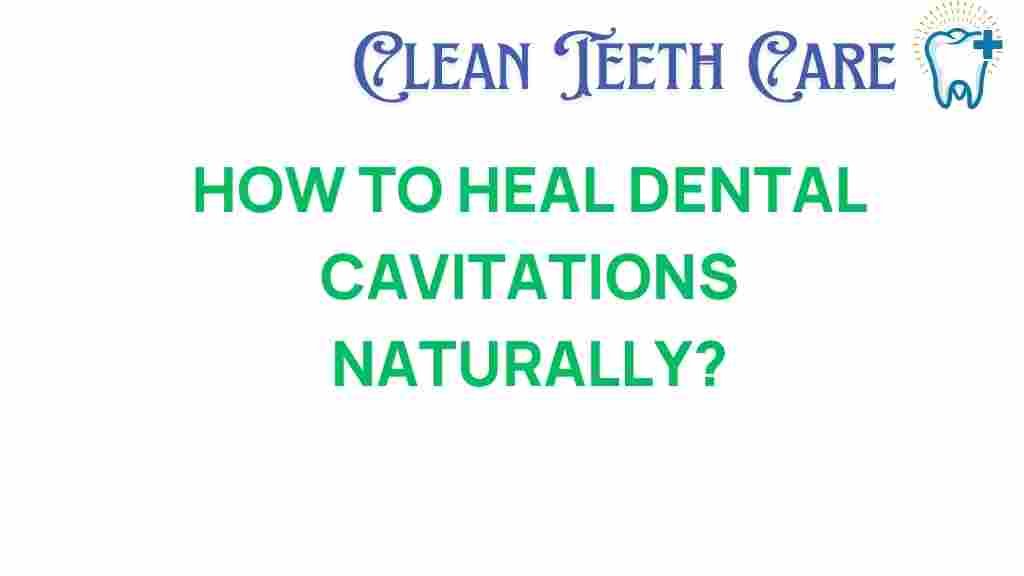Unlocking the Secrets: How to Heal Dental Cavitations Naturally
Dental cavitations are often an overlooked aspect of oral health, yet they can significantly impact your overall wellness. Understanding how to address dental cavitations naturally is essential for maintaining gum health and preventing further dental issues. In this article, we’ll explore various natural remedies and holistic treatments that can help you heal dental cavitations, enhance your dental care routine, and promote optimal oral health.
What Are Dental Cavitations?
Dental cavitations refer to the formation of voids or cavities in the jawbone, often resulting from past infections or untreated dental problems. These empty spaces can harbor bacteria, leading to further complications, including pain, infection, and systemic health issues. Recognizing the symptoms and understanding the causes is the first step towards effective healing.
Symptoms of Dental Cavitations
- Persistent jaw pain
- Sensitivity in the gums
- Swelling or inflammation in the jaw area
- Bad breath or an unpleasant taste in the mouth
- Unexplained tooth mobility
Causes of Dental Cavitations
Dental cavitations can occur due to several factors, including:
- Untreated dental infections
- Improper dental extractions
- Chronic gum disease
- Trauma to the jaw
Natural Remedies for Healing Dental Cavitations
Healing dental cavitations naturally requires a comprehensive approach that combines self-care, dietary changes, and natural remedies. Here’s a step-by-step process to guide you:
Step 1: Maintain Oral Hygiene
Good oral hygiene is critical for preventing and healing dental cavitations. Here are some tips:
- Brush your teeth at least twice a day with fluoride-free toothpaste.
- Floss daily to remove plaque and food particles between teeth.
- Consider using an antimicrobial mouthwash to reduce bacteria in the mouth.
Step 2: Use Herbal Remedies
Numerous herbs possess natural antibacterial and anti-inflammatory properties that can aid in healing dental cavitations:
- Clove Oil: Known for its analgesic properties, clove oil can help reduce pain and inflammation. Apply diluted clove oil directly to the affected area.
- Tea Tree Oil: This essential oil has potent antibacterial properties. Dilute it and use it as a mouth rinse to help fight infection.
- Turmeric: With its anti-inflammatory and healing properties, turmeric can be mixed with water to form a paste and applied to the affected area.
Step 3: Optimize Your Diet
A healthy diet plays a significant role in oral health and the healing of dental cavitations. Focus on including:
- High-Fiber Foods: Fruits and vegetables help in cleaning teeth and promoting gum health.
- Fermented Foods: Foods like yogurt, kefir, and sauerkraut support gut health, which is linked to oral health.
- Healthy Fats: Omega-3 fatty acids found in fish and flaxseeds can help reduce inflammation.
Step 4: Stay Hydrated
Drinking plenty of water is essential for maintaining oral health. Water helps wash away food particles and bacteria, reducing the risk of infection and promoting healing.
Step 5: Explore Holistic Treatments
Holistic treatments can complement natural remedies and promote healing:
- Ozone Therapy: This treatment involves the application of ozone gas to eliminate bacteria and promote healing.
- Homeopathy: Consult with a homeopathic practitioner for personalized remedies.
- Acupuncture: This ancient practice can help relieve pain and promote overall wellness.
Preventing Dental Cavitations
Prevention is always better than cure. Here are some strategies to prevent dental cavitations:
- Schedule regular dental check-ups and cleanings.
- Address dental issues promptly to avoid infections.
- Maintain a balanced diet rich in nutrients that support oral health.
- Limit sugary foods and beverages that contribute to tooth decay.
Troubleshooting Tips for Dental Cavitation Healing
Even with diligent care, you may encounter challenges while healing dental cavitations. Here are some troubleshooting tips:
- Persistent Pain: If pain persists despite treatment, consult your dentist or healthcare provider for further evaluation.
- Increased Sensitivity: If you experience heightened sensitivity, consider reducing acidic foods and using desensitizing toothpaste.
- Signs of Infection: If you notice swelling, fever, or pus, seek immediate professional help.
Conclusion
Healing dental cavitations naturally is achievable through a combination of proper oral hygiene, effective natural remedies, and holistic treatments. By maintaining a healthy lifestyle and being proactive about your dental care, you can enhance your gum health and prevent future dental issues. Remember to consult with healthcare professionals when necessary and explore options that work best for your individual needs.
For more information on holistic dental care and wellness, check out this comprehensive guide. Additionally, you may find valuable insights on oral health from external resources like the American Dental Association.
This article is in the category Treatments and created by CleanTeethCare Team
